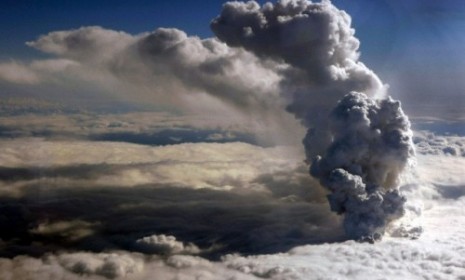Europe's volcanic ash cloud: What you need to know
The towering cloud of rock dust has grounded flights across northern Europe. What now?

A free daily email with the biggest news stories of the day – and the best features from TheWeek.com
You are now subscribed
Your newsletter sign-up was successful
Volcanic ash from Iceland has grounded planes across Europe, causing havoc for travelers and businesses around the world. The Eyjafjallajoekull volcano began erupting on March 20, and has continuously belched out ash, steam and smoke ever since. The eruption worsened signifcantly on Wednesday, creating a plume over a large swath of the continent. (See footage of the ash cloud.) Follow is a brief guide to Iceland's volcanic ash catastrophe:
How big is this cloud of ash?
The plume is too diffuse to be seen with the naked eye, so it's difficult to determine its exact size. As of Friday morning though, planes were avoiding the airspace over much of northern Europe from Great Britain in the west to Russia in the east. The plume occupies the upper atmosphere at an altitude between 20,000 and 60,000 feet.
The Week
Escape your echo chamber. Get the facts behind the news, plus analysis from multiple perspectives.

Sign up for The Week's Free Newsletters
From our morning news briefing to a weekly Good News Newsletter, get the best of The Week delivered directly to your inbox.
From our morning news briefing to a weekly Good News Newsletter, get the best of The Week delivered directly to your inbox.
Why can't planes fly through it?
Jet engines can't handle the dust. The fine rock particles that make up volcanic ash melt in an engine's combustion chamber, coating and clogging the turbine with molten glass. An airliner that flies into the cloud could fall out of the sky.
How many flights have been cancelled?
On Friday alone, approximately 17,000 commercial flights were grounded by the plume. Worldwide, more than 600,000 passengers have been delayed. The eruption has now caused more disruption to international air travel than 9/11, says CNN.
A free daily email with the biggest news stories of the day – and the best features from TheWeek.com
What countries have been most affected?
"Airports in much of Britain, France and Germany remain closed," reports Reuters. While conditions have improved and service has resumed to Ireland, Scotland and Sweden, airports throughout Central and Eastern Europe are now being shut down as the plume shifts, according to the Wall Street Journal.
How long will the disruption last?
At least into Saturday — but possibly longer. U.K. officials expect delays into next week. The situation ultimately depends both on weather conditions and the Eyjafjallajoekull volcano itself. Volcanologists warn of off-and-on delays for up to six months.
What has been the cost to the global economy?
Analysts in the UK say the eruption is costing the airline industry around $200 million a day. Worse still, the Economist warns that a "prolonged disruption of flights" could destroy the "tentative economic recovery" in recession-struck northern Europe. The effect on the US economy has so far been slight.
What about Iceland?
Iceland is the country probably worst affected by the global recession, but this eruption will only exacerbate its economic woes, according to Erna Hauksdottir of the Icelandic Travel Industry Association. "There’s no way for us to calculate the cost of this eruption, although we can say for sure that this is very, very bad," she told BusinessWeek.
Has anything like this happened in the U.S.?
Yes. When Mount St. Helens erupted in 1980, flights across the West Coast were grounded for several days.
What will the effect on the environment be?
While the volcano is releasing both sulfur dioxide and CO2 into the atmosphere, the amounts are minuscule when compared to those released by human activity on a daily basis. It could even be argued that the eruption has been good for the environment: Eyjafjallajoekull has belched out 7,412 tons of CO2, but the airplanes it has grounded would have emitted 206,465 tons.
Sources: Times (UK), New York Times, BBC, The Economist, Business Week
-
 Why is the Trump administration talking about ‘Western civilization’?
Why is the Trump administration talking about ‘Western civilization’?Talking Points Rubio says Europe, US bonded by religion and ancestry
-
 Quentin Deranque: a student’s death energizes the French far right
Quentin Deranque: a student’s death energizes the French far rightIN THE SPOTLIGHT Reactions to the violent killing of an ultraconservative activist offer a glimpse at the culture wars roiling France ahead of next year’s elections.
-
 Secured vs. unsecured loans: how do they differ and which is better?
Secured vs. unsecured loans: how do they differ and which is better?the explainer They are distinguished by the level of risk and the inclusion of collateral